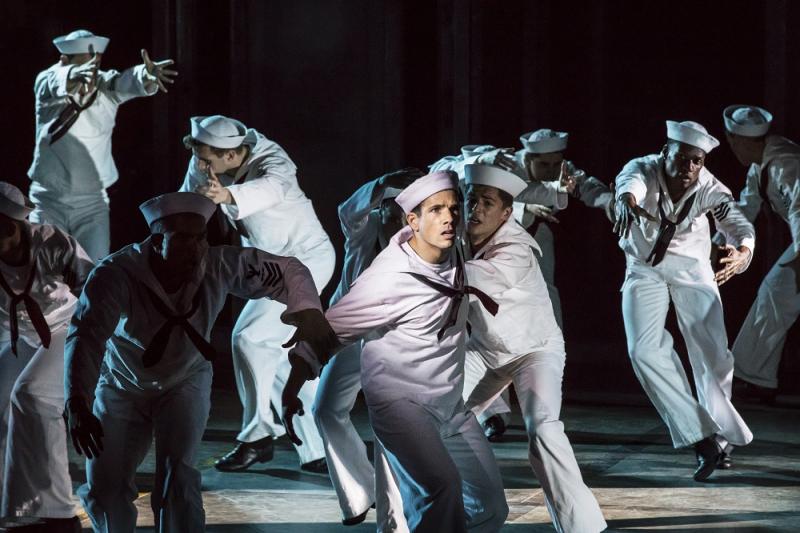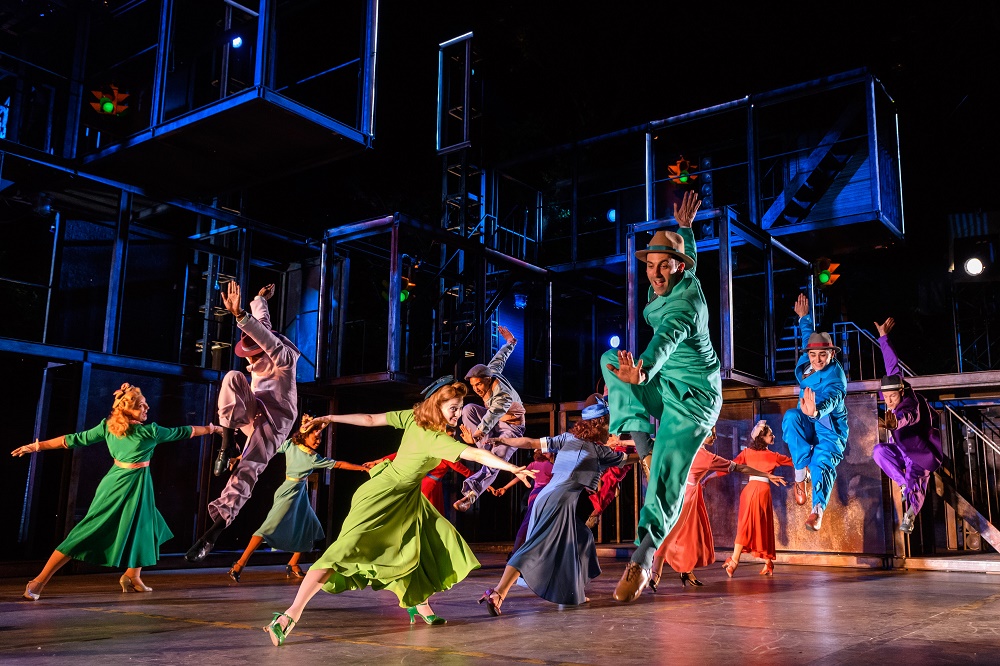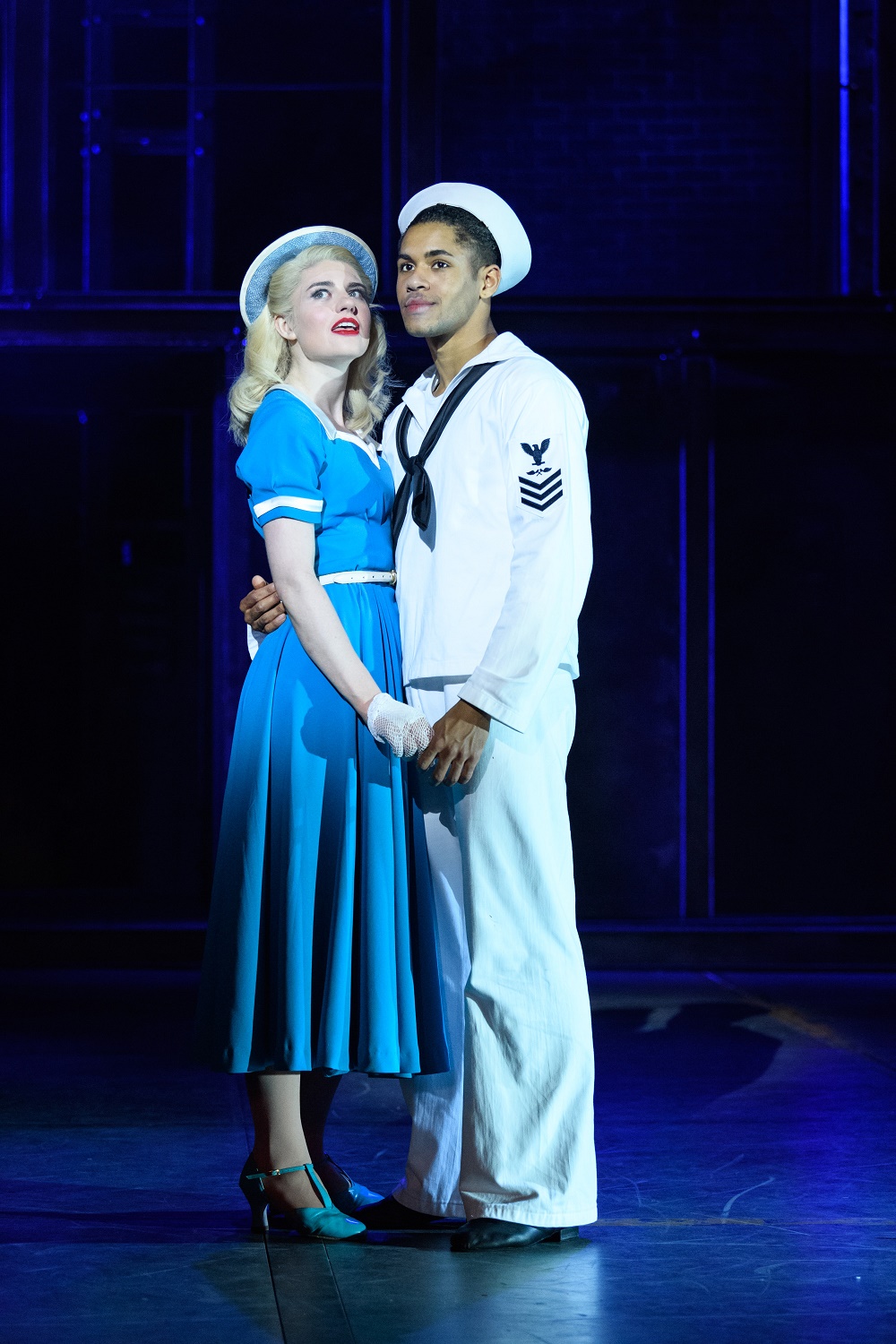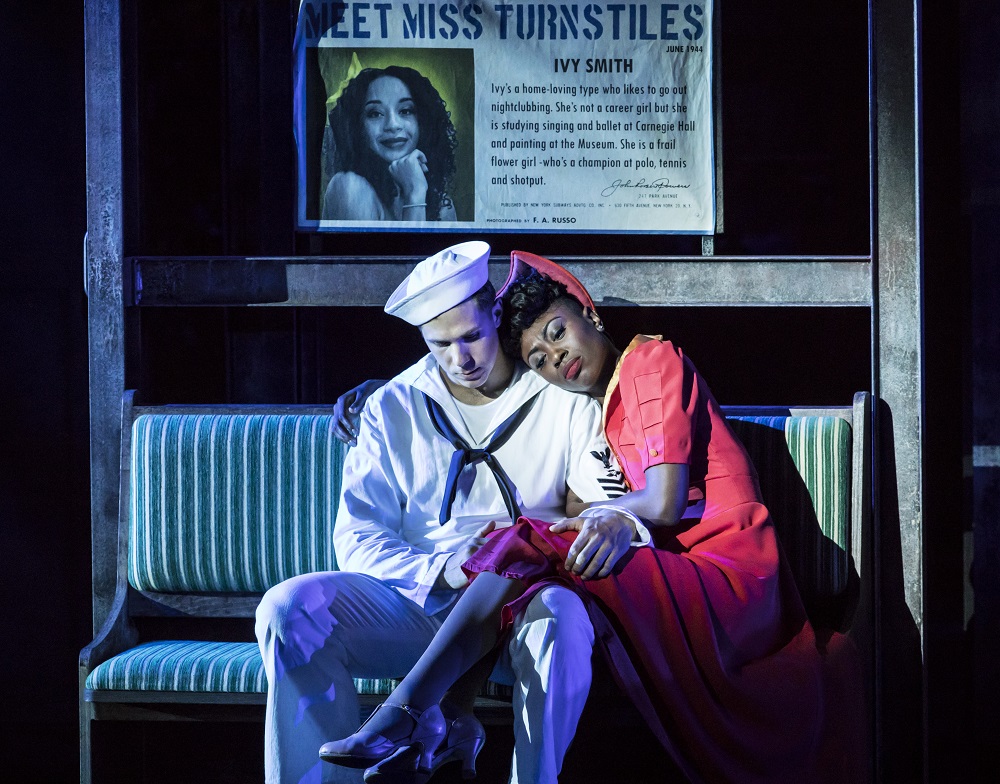On the Town review - triple threat Danny Mac and co are unmissable | reviews, news & interviews
On the Town review - triple threat Danny Mac and co are unmissable
On the Town review - triple threat Danny Mac and co are unmissable
Glorious reimagining of Broadway rarity at Regent's Park Open Air Theatre

On 8 April 1952, screenwriters Betty Comden and Adolph Green were chatting to Charlie Chaplin at a party when he started raving about a picture he’d seen the previous night at Sam Goldwyn’s house. It was called Singin’ in the Rain – had they heard of it? “Heard of it? We wrote it!” But then, this dynamic duo had form: five years earlier they wrote On the Town.
Their Broadway show is extravagant and extraordinary for not just for the songs switching between musical comedy numbers like “New York, New York” (no, not the Sinatra one) and elaborate full-blown ballet numbers choreographed by the legendary Jerome Robbins. But its demands are so huge that it's rarely staged. Step forward Drew McOnie.
In recent years, Regent’s Park Open Air Theatre has completely reimagined the type of shows it can stage. It was seriously smart to spot, for example, that The Crucible, a play about strange goings-on in the woods, would work brilliantly taking place amid actual woods, not to mention Sondheim’s Into the Woods. But would a musical about 24 hours in a beloved city work? Answer: yes, and then some. Peppered by a riot of period-perfect colour-block costumes, Peter McKintosh’s niftily suggestive, rather than literal, three-storey-high steel-boxes set gives all the necessary urban feel. Crucially, it also provides open space for the huge dance numbers with trucks neatly sliding on for the all-important subway carriage and indoor scenes.
Peppered by a riot of period-perfect colour-block costumes, Peter McKintosh’s niftily suggestive, rather than literal, three-storey-high steel-boxes set gives all the necessary urban feel. Crucially, it also provides open space for the huge dance numbers with trucks neatly sliding on for the all-important subway carriage and indoor scenes.
Light on plot – the three sailors individually want as much fun as they can pack into a day and night – the show can feel dated, as it did in the recent effortful Broadway revival. But McOnie's production gradually replaces effort with genuine excitement. His choreography is never short on exuberance. The cast (pictured above) quite rightly lunge, leap and pirouette as if their lives depended on it, but initially it feels slightly showbiz generic rather than character specific. Doubts are swept away, however, by his handling of narrative in the extended dance episodes.
Seemingly thwarted in his search for love, Gabey sings “Lonely Town”, which is followed by an explanatory pas de deux. McOnie transforms it into a duet of forbidden love between two members of the ensemble: one a gay man in the city, the other a terrified sailor looking for sex. It’s not just a brilliant relocation, it’s a riveting dramatisation in dance both of what would have been the emotional truth for more than one sailor let loose in wartime New York, but also of the aching melancholy and emotional brass writing brimming over in Bernstein’s score.
Lovelorn Gabey (the Gene Kelly role) is played by the show’s draw, Strictly Come Dancing star Danny Mac. His winning flair and dynamism burn off him, but the best surprise is that he’s a genuine triple threat with vocal chops too. At the height of the ballad “Lucky to Be Me”, the writing sails up to around a high G at which Mac sounds simply joyous.
 He’s superbly flanked by easeful performances from devil-may-care Samuel Edwards as Ozzie and Jacob Maynard as Chip, looking for all the world as if he’s been playing the role throughout rehearsal when in fact he stepped up from understudying when Fred Haig was injured during previews.
He’s superbly flanked by easeful performances from devil-may-care Samuel Edwards as Ozzie and Jacob Maynard as Chip, looking for all the world as if he’s been playing the role throughout rehearsal when in fact he stepped up from understudying when Fred Haig was injured during previews.
The women are even more characterful. Gum-chewing Lizzy Connolly (pictured above with Jacob Maynard) plays a blinder as taxi-driving Hildy with not so much a glint in her eye as a laser beam, plus comic timing that allows her to leap from kitten to full-on tiger in the blink of an eye. As no-nonsense anthropologist Claire de Loone who only lets her emotions out whenever she gets “Carried Away”, crisp-as-Vermouth, towering, scissor-legged Miriam-Teak Lee (pictured below with Samuel Edwards) is so delicious that you wonder where she has been hiding… only to discover that this is, astoundingly, her professional debut. (Casting directors, get over there quick.)
Casting almost throughout is strong. Mark Heenehan turns Judge Pitkin, a role usually overplayed into pomposity, into a wave of charm. Elsewhere, there are times when McOnie’s need to drive everything forward results in some over-ripe playing and missed detail, but it’s a tiny price to pay for his covering of what are traditionally seen as major holes in the construction. His impressively tight control of the transitions between scenes ensures the flow never stops. There’s a real sense of everyone racing through 24 hours of pleasure in the midst of wartime. This is not only suggested, but finally fully developed in McOnie’s thrilling reinvention of Gabey’s dream ballet en route to Coney Island. Instead of a plot rehash, McOnie presents a nightmare vision of hopes dashed by death. The choreography is at its most passionate and it is fiercely ignited, punctuated and presented by Howard Hudson's superbly imaginative lighting.
His impressively tight control of the transitions between scenes ensures the flow never stops. There’s a real sense of everyone racing through 24 hours of pleasure in the midst of wartime. This is not only suggested, but finally fully developed in McOnie’s thrilling reinvention of Gabey’s dream ballet en route to Coney Island. Instead of a plot rehash, McOnie presents a nightmare vision of hopes dashed by death. The choreography is at its most passionate and it is fiercely ignited, punctuated and presented by Howard Hudson's superbly imaginative lighting.
Small wonder that the regretful final quartet “Some Other Time” (one of Bernstein’s finest achievements, with a heartbreaking Comden & Green lyric) is sung with such moving pathos and restrained power. On the Town is so big and buoyant that these days it tends to comes across as brash. McOnie’s achievement is to rediscover its richness and range. Unmissable.
- On the Town at Regent's Park Open Air Theatre until 1 July
- More theatre reviews on theartsdesk
The future of Arts Journalism
You can stop theartsdesk.com closing!
We urgently need financing to survive. Our fundraising drive has thus far raised £49,000 but we need to reach £100,000 or we will be forced to close. Please contribute here: https://gofund.me/c3f6033d
And if you can forward this information to anyone who might assist, we’d be grateful.

Subscribe to theartsdesk.com
Thank you for continuing to read our work on theartsdesk.com. For unlimited access to every article in its entirety, including our archive of more than 15,000 pieces, we're asking for £5 per month or £40 per year. We feel it's a very good deal, and hope you do too.
To take a subscription now simply click here.
And if you're looking for that extra gift for a friend or family member, why not treat them to a theartsdesk.com gift subscription?
more Theatre
 Mary Page Marlowe, Old Vic review - a starry portrait of a splintered life
Tracy Letts's Off Broadway play makes a shimmeringly powerful London debut
Mary Page Marlowe, Old Vic review - a starry portrait of a splintered life
Tracy Letts's Off Broadway play makes a shimmeringly powerful London debut
 Little Brother, Soho Theatre review - light, bright but emotionally true
This Verity Bargate Award-winning dramedy is entertaining as well as thought provoking
Little Brother, Soho Theatre review - light, bright but emotionally true
This Verity Bargate Award-winning dramedy is entertaining as well as thought provoking
 The Unbelievers, Royal Court Theatre - grimly compelling, powerfully performed
Nick Payne's new play is amongst his best
The Unbelievers, Royal Court Theatre - grimly compelling, powerfully performed
Nick Payne's new play is amongst his best
 The Maids, Donmar Warehouse review - vibrant cast lost in a spectacular-looking fever dream
Kip Williams revises Genet, with little gained in the update except eye-popping visuals
The Maids, Donmar Warehouse review - vibrant cast lost in a spectacular-looking fever dream
Kip Williams revises Genet, with little gained in the update except eye-popping visuals
 Ragdoll, Jermyn Street Theatre review - compelling and emotionally truthful
Katherine Moar returns with a Patty Hearst-inspired follow up to her debut hit 'Farm Hall'
Ragdoll, Jermyn Street Theatre review - compelling and emotionally truthful
Katherine Moar returns with a Patty Hearst-inspired follow up to her debut hit 'Farm Hall'
 Troilus and Cressida, Globe Theatre review - a 'problem play' with added problems
Raucous and carnivalesque, but also ugly and incomprehensible
Troilus and Cressida, Globe Theatre review - a 'problem play' with added problems
Raucous and carnivalesque, but also ugly and incomprehensible
 Clarkston, Trafalgar Theatre review - two lads on a road to nowhere
Netflix star, Joe Locke, is the selling point of a production that needs one
Clarkston, Trafalgar Theatre review - two lads on a road to nowhere
Netflix star, Joe Locke, is the selling point of a production that needs one
 Ghost Stories, Peacock Theatre review - spirited staging but short on scares
Impressive spectacle saves an ageing show in an unsuitable venue
Ghost Stories, Peacock Theatre review - spirited staging but short on scares
Impressive spectacle saves an ageing show in an unsuitable venue
 Hamlet, National Theatre review - turning tragedy to comedy is no joke
Hiran Abeyeskera’s childlike prince falls flat in a mixed production
Hamlet, National Theatre review - turning tragedy to comedy is no joke
Hiran Abeyeskera’s childlike prince falls flat in a mixed production
 Rohtko, Barbican review - postmodern meditation on fake and authentic art is less than the sum of its parts
Łukasz Twarkowski's production dazzles without illuminating
Rohtko, Barbican review - postmodern meditation on fake and authentic art is less than the sum of its parts
Łukasz Twarkowski's production dazzles without illuminating
 Lee, Park Theatre review - Lee Krasner looks back on her life as an artist
Informative and interesting, the play's format limits its potential
Lee, Park Theatre review - Lee Krasner looks back on her life as an artist
Informative and interesting, the play's format limits its potential
 Measure for Measure, RSC, Stratford review - 'problem play' has no problem with relevance
Shakespeare, in this adaptation, is at his most perceptive
Measure for Measure, RSC, Stratford review - 'problem play' has no problem with relevance
Shakespeare, in this adaptation, is at his most perceptive

Add comment